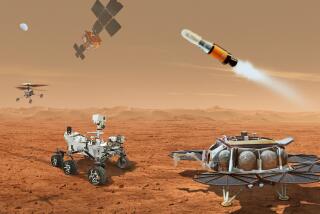Inquisition at JPL
In all the years since Jules Verne first conjoined science and fiction to create a literary genre, nobody ever imagined that mankind’s first real exploration of another world would be carried out by a couple of robotic dune buggies controlled from an arroyo northwest of Pasadena.
That’s exactly how things have turned out, though. For the last four years, two robot rovers operated from the Jet Propulsion Laboratory in La Canada Flintridge have been moving across the surface of Mars, taking photographs and collecting information. It’s an epic event in the history of exploration, one of many for which JPL’s 7,000 civilian scientists and engineers are responsible -- when they’re not fending off the U.S. government’s attempts to conduct an intimidating and probably illegal inquisition into the intimate details of their lives.
Talk about the thanks of a grateful nation.
The problem began -- as so many have -- in the security mania that gripped the Bush administration after 9/11. Presidential Directive No. 12, issued by the Department of Homeland Security, directed federal agencies to adopt a uniform badge that could be used by employees and contractors to gain access to government facilities. Most agencies let the directive become a dead letter, too complex and expensive to implement.
NASA Administrator Michael Griffin, however, is one of the Bush administration’s true believers, and his first reflex always is a crisp salute. He directed Caltech, which has a contract to run JPL for NASA, to make sure all of the lab’s employees complied. The university initially resisted, then caved when NASA threatened to withdraw its contract. Worse, the government demanded that the scientists, in order to get the badges, fill out questionnaires on their personal lives and waive the privacy of their financial, medical and psychiatric records. The government also wanted permission to gather information about them by interviewing third parties.
In other words, as the price of keeping their jobs, many of America’s finest space scientists were being asked to give the feds virtually blanket permission to snoop and spy and collect even malicious gossip about them from God knows who.
Investigators wanted license to seek information as to whether “there is any reason to question [applicants’] honesty or trustworthiness.” At one point, JPL’s internal website posted an “issue characterization chart” -- since taken down -- that indicated the snoops would be looking for “patterns of irresponsible behavior as reflected in credit history ... sodomy ... incest ... abusive language ... unlawful assembly ... homosexuality.” (We’ll leave it to others to explain a standard that links incest with unlawful assembly.)
Twenty-eight of JPL’s senior scientists sued in federal court to stop the government and Caltech from forcing them to agree to the background checks as the price of keeping their jobs. About 300 others signed a petition indicating they had agreed to the probes only under duress. All pointed out that the information being demanded was the sort usually associated with the security clearances required to work on classified defense projects. Less than 10% of the work done at JPL is classified, and the scientists involved already obtain security clearances. Imposing that standard on civilian scientists, the plaintiffs argued, violates their right to hold personal information private, constitutes an unreasonable search under the 14th Amendment and requires statutory authority.
A district court judge initially disagreed, but last Friday, a three-judge panel of the U.S. 9th Circuit Court of Appeals overturned that ruling. Writing for a unanimous panel, Judge Kim M. Wardlaw stayed the background checks and said the scientists’ claims deserve trial. They’re due back in court next month.
Many at the lab believe that there’s more than governmental overreaching at work here. They point out that Griffin is one of those who remain skeptical that human actions contribute to global warming, and that some of JPL’s near-Earth science has played a critical role in establishing the empirical case to the contrary. They see the background checks as the first step toward establishing a system of intimidation that might be used to silence inconvenient science.
One of the plaintiffs in this suit, Scott Maxwell, drives the Mars rovers. He and his colleagues at the lab are witnesses and heirs to the extraordinary declaration of American wisdom and altruism that Neil Armstrong and “Buzz” Aldrin made on behalf of us all when they left a memorial to mark man’s first lunar landing: “We came in peace for all mankind.”
As custodians of a great human adventure, the men and women of JPL deserve better from their own country than to be victimized by a shabby crowd of apprentice Torquemadas. By resisting this bargain-basement inquisition, JPL plaintiffs have rendered us all yet another service. Who would have guessed that the folks with the pocket protectors would turn out to be the ones with the right stuff?
More to Read
Start your day right
Sign up for Essential California for news, features and recommendations from the L.A. Times and beyond in your inbox six days a week.
You may occasionally receive promotional content from the Los Angeles Times.






